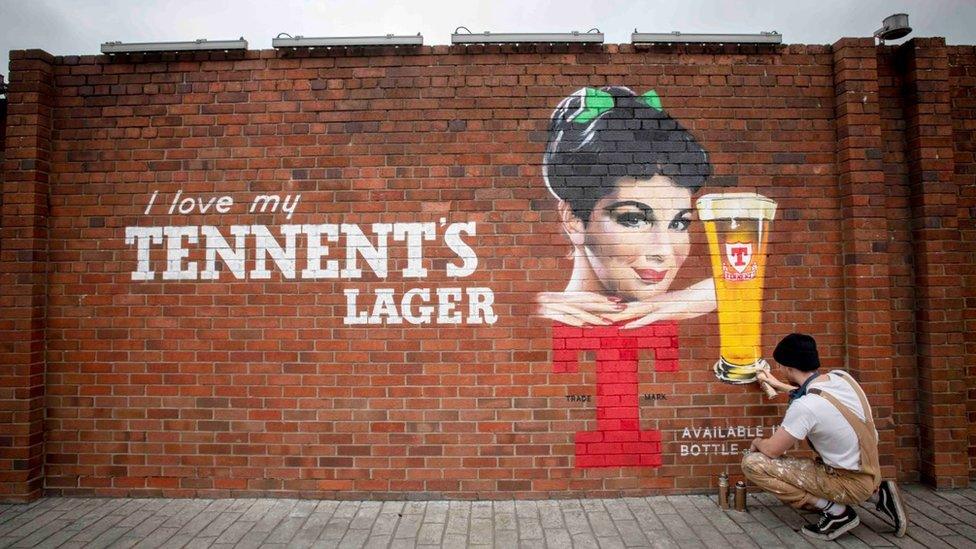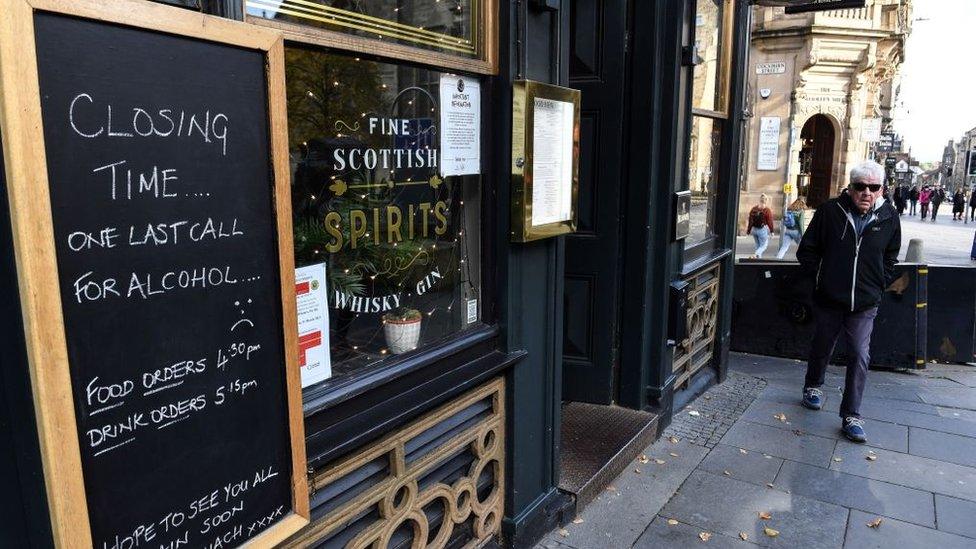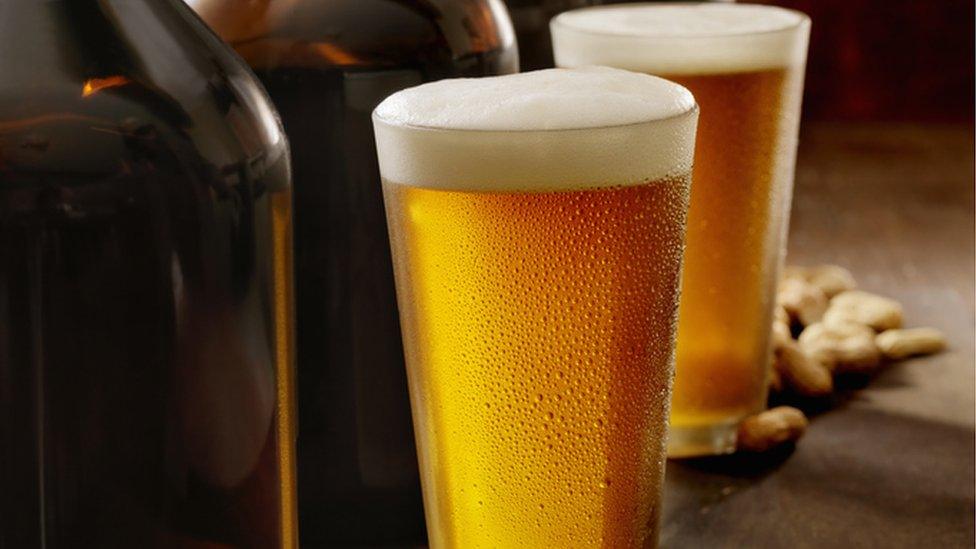Lager laager: When the on-trade switches off
- Published

Tennent's lager reigned supreme in Scotland's pub trade, so how has it adjusted to lockdown and renewed restrictions?
The shift from keg to tinned and bottled booze has been a vital part of the transition.
While putting in their defences, companies with deeper resources are trying to ensure their business customers also survive and reach the other side of the pandemic.
It's just a pint of lager, but according to Time Out website, it's brewed in the eighth coolest neighbourhood on the planet.
With the current focus on the hospitality trade, Tennent's sheds some light on what's been going on in Scotland's pub trade.
From its Wellpark brewery on the edge of Dennistoun in Glasgow, it has a huge reach into Scottish drinking habits.
Lager is the biggest selling drink in the on-trade of pubs and restaurants. And within the lager category, Tennent's sells nearly half of the Scottish total.
Or at least, it did. Now, we can't be so sure, except to note that, temporarily, there is no on-trade in Scotland.
The market has been upended by lockdown and the subsequent months of tentative reopening of licensed premises, and now a renewed bar on selling alcohol for consumption on the premises.

Licensed premises have been hit hard by lockdown measures
All companies have had to put up their defences - in this case, a sort of lager laager. And many have reached out to support business clients as well, in a bid to help them survive the pandemic onslaught.
No/low alcohol
So what can we learn from the half-year figures put out by Ireland-based C&C, owners of Tennent's for the past 11 years, and also of Magner's cider? The figures cover March to the end of August.
Revenue for the whole group fell 55%, leaving an operating loss of €12m, on turnover of €387m.
On-trade sale of lager fell a whopping 81%. For Tennent's, the decline was 65% over the six months.
Off-trade lager was up lots, by 32%, but nowhere near enough to offset the decline in pints pulled.
In total, British sales of Tennent's were down 18%, and while it gained market share slightly, at 26% of tinned and bottled lagers sold through off-sales, that is a long way from its dominance at the bar.
Magner's cider was fizzing in the off-trade as well, up by 27% in Britain, with total British volumes of cider sales hardly falling at all.
By the end of August, C&C was trading through only 78% of the on-trade outlets it had supplied in August last year.
Meanwhile, responding to the recent growth in no/low alcohol drinks, Tennent's Light was launched in pubs just ahead of lockdown, and in July, it went into off-licences.
This month, in off-sales, Tennent's Zero has been launched (Guinness brewers Diageo has just announced its own no-alcohol option, Guinness 0.0.).
Convenience wine
With dependence on the on-trade in normal times, the company mobilised its financial firepower to help out with its trade customers. As an enthusiastic user of jargon, C&C points out that it is "structurally integral to the markets we serve".
Old kegs, gone stale during lockdown, were replaced one-for-one. Moratoriums on loan repayments were agreed. There was support with the hygiene materials, screens and extra costs to prepare pubs for reopening.

C&C has a stake in Admiral Taverns, including around 950 tenanted outlets. That required €7m of liquidity support.
Big, long pub chains are more a feature of the English on-trade than the Scottish ones. And they're shedding jobs. In the case of Marston's, 2,150 are going.
From C&C comes a strong hint that it could be going in the same direction: "We have begun to take action to permanently right-size our fixed cost base."
Being diversified, C&C also owns wholesale distributors of drinks, Matthew Clark and Bibendum. It's the biggest such distributor to the hospitality sector in Britain and Ireland, supplying 35,000 licensed outlets.
There too, a seemingly catastrophic fall in volumes, of 63% - from 16 million cases of wine and spirits to 5.8 million.
So the company shifted suddenly into supplying the off-trade, and while that's dominated by the big supermarkets, Matthew Clark managers saw the opportunity in stepping up service to the independent convenience store operators, and throwing in a loyalty scheme. The result was revenues in those sales went up by 71%.
'Robust' condition
You can also see the measures necessary to handle the financial challenges from such drastic changes in revenue.
The Dublin company's half-year results show it had to persuade creditors to ease up on loan conditions, known as covenants, and that has been secured through to February 2022.
Debt rose by €45m, to €371m, and liquidity was helped by making use of the Covid corporate financing facility, the support scheme aimed at big stock exchange-listed firms and operated through the Bank of England.
That apparently puts London-listed C&C in reasonable (or in its word "robust") condition to withstand renewed restrictions, hospitality closures and constraints.
But the prospects for having a recognisable on-trade of pubs, clubs and restaurants to recover its business model are not at all robust.
The vital Christmas trade looks "uncertain and challenging", and in the jargon, there is "limited near-term visibility".
In other words, none of us have the foggiest.r
